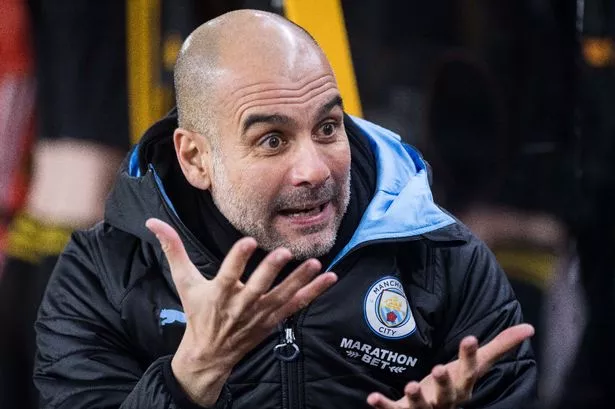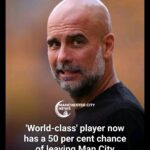Man City Star legs have gone’ – Man City make transfer decision

The summer transfer window of 2025 promises to be one of the most transformative periods in Manchester City’s recent history, with veteran midfielder Ilkay Gundogan emerging as a prime candidate for departure amid concerns about his declining physical capabilities. The German international, who returned to the Etihad Stadium with great fanfare after his brief Barcelona sojourn, now finds himself at the center of speculation regarding his future, with Turkish giants Galatasaray reportedly monitoring his situation closely.
The Gundogan Dilemma: Age Catches Up with Excellence
At 34 years of age, Ilkay Gundogan represents both the wisdom of experience and the inevitable challenges that come with Father Time’s relentless march. The midfielder’s journey back to Manchester City after his year-long stint at Barcelona was initially viewed as a homecoming story, a veteran leader returning to familiar surroundings to provide crucial stability and guidance to Pep Guardiola’s evolving squad.
However, the reality of Gundogan’s second stint at City has been more complex than the romantic narrative many had envisioned. According to well-connected former Manchester United and Blackburn Rovers chief scout Mick Brown, whose extensive network within football circles provides valuable insights into the inner workings of top-tier clubs, the German midfielder’s physical condition has become a significant concern within the City hierarchy.
“Ilkay Gundogan’s legs have gone,” Brown stated bluntly, encapsulating the harsh reality that even the most technically gifted players must eventually confront. This assessment, while seemingly brutal, reflects the unforgiving nature of elite football, where physical decline can render even the most accomplished players surplus to requirements almost overnight.
The situation is particularly poignant given Gundogan’s undeniable quality and football intelligence. His ability to read the game, his passing range, and his positional awareness remain largely intact. However, in Guardiola’s high-intensity system, where players are expected to cover vast distances and engage in relentless pressing, the slight decline in pace and stamina can prove to be decisive factors in team selection.
Galatasaray’s Ambitious Pursuit
Turkish football has increasingly become an attractive destination for experienced European players seeking to extend their careers while maintaining competitive standards. Galatasaray, one of Turkey’s most successful and ambitious clubs, has demonstrated their financial muscle and commitment to attracting high-profile signings through their recent acquisition of Leroy Sane from Bayern Munich.
The signing of Sane, a former City winger himself, represents a statement of intent from the Istanbul-based club. The substantial wages offered to secure the German international’s services have sent ripples through the football world, establishing Galatasaray as serious players in the transfer market. This financial capability positions them as credible suitors for other established stars, including Gundogan.
Brown’s assessment of Galatasaray’s interest in Gundogan is particularly illuminating: “They showed they’ve got money to spend and to offer players, because they’ve just signed Leroy Sane and spent a bomb on his wages. Going over to Turkish football might suit him at this stage of his career.”
The Turkish Super Lig offers several advantages for players in Gundogan’s position. The league’s competitive standard, while not matching the Premier League’s intensity, remains respectable and would allow the German midfielder to showcase his technical abilities without the extreme physical demands of English football. Additionally, the cultural experience and the passionate fanbase of clubs like Galatasaray could provide a refreshing change of pace for a player who has experienced the pressures of Europe’s elite leagues.
Guardiola’s Squad Revolution
Pep Guardiola’s approach to squad management has always been characterized by his willingness to make difficult decisions, even when they involve beloved players. The Catalan coach’s philosophy centers on maintaining the highest possible standards, and this often requires making painful choices about aging stars who may no longer meet those exacting requirements.
The reported exodus of up to seven players from Manchester City’s squad this summer represents more than just routine squad rotation; it signifies a fundamental shift in Guardiola’s thinking. The manager’s desire to “trim his squad” following major arrivals reflects a calculated approach to team building that prioritizes long-term sustainability over short-term sentiment.
The arrivals of Tijjani Reijnders, Rayan Cherki, and Rayan Ait-Nouri have already begun to reshape City’s squad composition, with more reinforcements expected to follow. These additions represent a clear investment in youth and athleticism, qualities that align with Guardiola’s evolving tactical vision for the club.
Brown’s insight into Guardiola’s mindset is particularly revealing: “Guardiola has made it clear he wants his squad to be cut. Now, decisions have to be made about who they want to get rid of.” This statement encapsulates the clinical nature of modern football management, where emotional attachments must be subordinated to tactical and financial considerations.
Financial Considerations and Wage Structure
The involvement of former City financial adviser Stefan Borson in discussions about Gundogan’s future highlights the complex financial dynamics at play. Borson’s suggestion that Gundogan could leave alongside Jack Grealish to “clear the wage bill” underscores the economic pressures facing even the wealthiest clubs in modern football.
Manchester City’s financial management has become increasingly sophisticated, with the club needing to balance competitive success with fiscal responsibility. The wages of veteran players like Gundogan, while justified by their contributions and experience, represent significant financial commitments that may no longer align with the club’s strategic direction.
The potential departures of high-earning players would provide City with greater flexibility in the transfer market, allowing them to pursue younger targets who may demand lower initial wages but offer greater long-term value. This approach reflects a broader trend in football toward more sustainable financial models that prioritize player development and resale value.
The Barcelona Interlude: Lessons Learned
Gundogan’s brief spell at Barcelona provides valuable context for understanding his current situation at Manchester City. His departure from City in 2023 was initially viewed as a desire for a new challenge and the opportunity to experience a different footballing culture. However, his return after just one season suggested that the grass was not necessarily greener on the other side.
The Barcelona experience may have provided Gundogan with perspective on his career priorities and the importance of finding an environment where his skills are appreciated and utilized effectively. His struggles to establish himself as a regular starter upon his return to City have raised questions about whether his brief absence affected his standing within Guardiola’s tactical framework.
Brown’s observation that City officials have “not been totally convinced he’s still got the legs to play regularly at this level” since his return suggests that the Barcelona interlude may have inadvertently highlighted the physical decline that was already beginning to manifest. The year away from the Premier League’s intensity may have provided temporary respite, but it also meant missing a crucial period of adaptation to the league’s evolving demands.
Bernardo Silva: Another Domino Set to Fall
The potential departure of Bernardo Silva adds another layer of complexity to Manchester City’s summer plans. The Portuguese midfielder’s situation parallels Gundogan’s in some respects, though Silva’s age and recent performances suggest different motivations for a potential move.
Silva’s attractiveness to clubs in Spain, Portugal, and Saudi Arabia reflects his continued high standing in the football world. Unlike Gundogan, whose potential move appears to be driven by declining physical capabilities, Silva’s situation seems more focused on seeking new challenges and possibly financial opportunities.
The willingness of Guardiola to “not stand in his way should a significant offer arrive” demonstrates the manager’s pragmatic approach to squad management. Even players who remain at peak performance levels may be allowed to leave if the right circumstances align, reflecting the fluid nature of modern football squads.
The Broader Context of Squad Evolution
Manchester City’s potential summer exodus represents a natural evolution in the club’s development under Guardiola. The manager’s tenure has been marked by periodic squad overhauls, each designed to maintain competitive standards while adapting to changing tactical trends and player availability.
The integration of younger players like Reijnders, Cherki, and Ait-Nouri represents an investment in the future, but it also creates competition for places that may disadvantage older players whose physical capabilities are beginning to decline. This dynamic is particularly relevant for players like Gundogan, whose technical abilities remain largely intact but whose physical limitations may become more apparent in training and match situations.
The challenge for Guardiola lies in balancing the need for experienced leadership with the demands of maintaining competitive intensity. Players like Gundogan bring invaluable experience and tactical understanding that cannot be easily replaced, but these qualities must be weighed against the physical requirements of modern football.
Turkish Football’s Growing Appeal
The emergence of Turkish football as an attractive destination for European stars represents a significant development in the global transfer market. Clubs like Galatasaray have demonstrated their willingness to invest heavily in established players, creating opportunities for stars who may be seeking alternatives to the traditional European elite leagues.
The Turkish Super Lig offers several advantages for players in Gundogan’s position. The league’s competitive standard provides a meaningful challenge while potentially offering a less physically demanding environment than the Premier League. The passionate fanbase and rich footballing culture of Turkish clubs also present attractive lifestyle considerations for players seeking new experiences.
Galatasaray’s pursuit of Gundogan reflects their ambition to compete at the highest levels of European football. The addition of a player of his caliber and experience would provide significant value both on and off the pitch, potentially inspiring younger players while adding tactical sophistication to their midfield.
The Human Element: Career Transitions and Personal Considerations
Behind the tactical analyses and financial calculations lies the human story of a player navigating the later stages of a distinguished career. Gundogan’s journey from Borussia Dortmund to Manchester City, through his Barcelona adventure, and potentially to Turkey, represents the complex decision-making processes that elite athletes must navigate.
The transition from being a guaranteed starter to facing uncertainty about playing time represents one of the most challenging aspects of professional football. For a player of Gundogan’s stature and achievement, accepting a reduced role or seeking opportunities elsewhere requires significant personal and professional reflection.
The potential move to Galatasaray would offer Gundogan the opportunity to remain competitive while potentially taking on a leadership role in a new environment. The cultural experience of playing in Turkey could provide personal enrichment while extending his playing career in a meaningful way.
Conclusion: The End of an Era?
As Manchester City prepares for what could be a transformative summer transfer window, the potential departures of Ilkay Gundogan and Bernardo Silva would mark the end of a significant era in the club’s history. Both players have been instrumental in City’s recent success, contributing to multiple Premier League titles and the club’s first Champions League triumph.
However, football’s relentless pace demands constant evolution, and even the most successful clubs must adapt to changing circumstances. Guardiola’s willingness to make difficult decisions about aging stars demonstrates the clinical mindset required to maintain competitive excellence over extended periods.
For Gundogan, the potential move to Galatasaray represents an opportunity to write a new chapter in his career while potentially finding an environment where his considerable talents can continue to flourish. The Turkish club’s ambition and financial resources suggest they could provide a platform for the German midfielder to remain competitive while experiencing a new footballing culture.
The summer of 2025 may well be remembered as a turning point for Manchester City, marking the transition from one generation of stars to the next. Whether Gundogan’s “legs have gone” or not, his potential departure would represent the end of an era and the beginning of an exciting new chapter for both player and club.
As the transfer window unfolds, the football world will be watching to see how these high-profile moves develop and what they mean for the future of the clubs and players involved. The beautiful game’s constant evolution continues, with new stories emerging from the complex interplay of ambition, opportunity, and the inexorable march of time.















